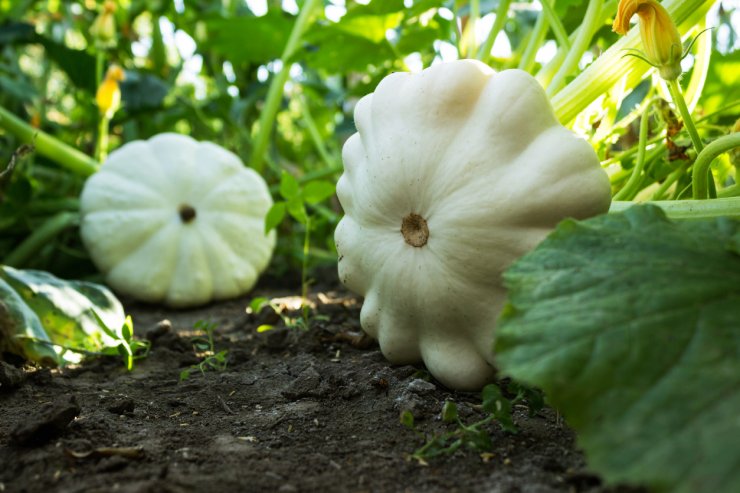
Pattypan Squash

Pattypan Squash
As you can see, squash is a nutrient-packed food. Summer squash generally carries more water than winter squash, which has denser flesh—so winter squash is considered more nutritious. However, both types offer a variety of health benefits.
Heart Health
Yellow squash can reduce the risk of heart disease, as it has negligible fat and cholesterol. The magnesium in squash has been shown to also reduce the risk of heart attack and stroke, and added to potassium in squash helps in reducing high blood pressure.
Also, vitamin C and beta-carotene aid in preventing the buildup of oxidized cholesterol in the walls of blood vessels. Folate in yellow squash helps in removing an unhealthy metabolism byproduct that’s responsible for heart attack and stroke, and also lowers cholesterol levels.
Weight Loss
Summer squash is a very good choice for weight loss, as it is fat-free and very low in calories. A cup of yellow squash contains about 36 calories, 7 grams of carbohydrates, 1 gram of protein, and less than 1 gram of fat besides being cholesterol-free. It derives its few calories from its carbohydrate content, which is also quite low. Consider replacing higher-calorie vegetables like potatoes and corn with yellow squash to help lose weight.
Cancer
A high content of antioxidants in summer squash helps in eliminating free radicals from the body. The high levels of beta-carotene provide protection from pollutants and chemicals that can lead to cancer. Summer squash is also a rich source of vitamin C, which prevents premature aging and cancer. It also contains vitamin A, which provides protection against lungs and oral cavity cancers.
Bone Health
Yellow squash contains abundant amounts of manganese and vitamin C. Manganese helps in maintaining healthy bone structure, calcium absorption, enzyme creation, and bone building. Vitamin C is involved in the production of collagen, which is vital for building bone mass. Magnesium also contributes to the health of joints and bones. Other minerals in squash such as iron, folate, zinc, and phosphorus contribute to the mineral health of bones and provide protection against osteoporosis.
Eye Health
Summer squash contains high amounts of beta-carotene and lutein. Dietary lutein plays an important role in preventing the onset of cataracts and macular degeneration, which often leads to blindness. A cup of summer squash contains about 135 milligrams of beta carotene and 2400 micrograms of lutein.
Colon
The abundant content of fiber in yellow squash makes it beneficial for colon health. Fiber helps in the excretion of toxins from the body and maintains colon health by preventing constipation. A cup of yellow squash provides about 2.52 grams of fiber.
Prostate
Yellow squash is effective in alleviating the symptoms of a condition called benign prostatic hypertrophy, or BPH. This disease is characterized by an enlarged prostate gland that causes difficulties in both urinary and sexual functions.
Premenstrual Syndrome (PMS)
Summer squash is a good source of manganese. A study proved that the women who consumed high amounts of this mineral as part of their daily diet suffered from lesser mood swings and cramps than others.
Immune System
Vitamin C in squash boosts the immune system, in a way preventing colds and fighting allergies. The rinds of some varieties of squash are a rich source of fiber, which aids in proper digestion and can prevent many types of diseases.
Diabetes
The dietary fiber in this vegetable helps you fight elevated blood sugar levels. This way, it can help resist the onset of diabetes.
Blood Pressure
This vegetable is rich in potassium, which can help in relaxation of blood vessels and arteries, effectively reducing high blood pressure. Potassium is also required by the body for fluid balance in tissues and cells. Summer squash also contains magnesium, which essentially helps in the absorption of potassium. It contains zinc, which also plays a role in maintaining normal blood pressure in the human body.
Skin Health
A balanced diet greatly helps in providing certain vital nutrients that can keep your skin healthy. Vegetables—or fruit, in the actual case of squash—are good for skin. Being rich in vitamins, minerals, and antioxidants, squash is quite beneficial for your skin. Squash is an excellent source of vitamin A, a powerful antioxidant that’s required for maintaining proper health and integrity of skin. It also has beta-carotene that gets converted into vitamin A.
Squash also protects against the damaging effects of sun exposure and prevents dehydration. Its vitamin C fights free radicals within the body, thus preventing signs of aging like fine lines, wrinkles, and pigmentation. Regular consumption of squash keeps your skin hydrated.
Hair
Certain vegetables are responsible for stimulating hair growth, and squash is one of them because of the beta-carotene, which is a safe, non-toxic form of vitamin A. This pigment is vital for forming and maintaining healthy hair. It prevents hair breakage and promotes optimum growth.
Did you know that squash could be so healthful? Please tell us which health benefits are especially important to you.



